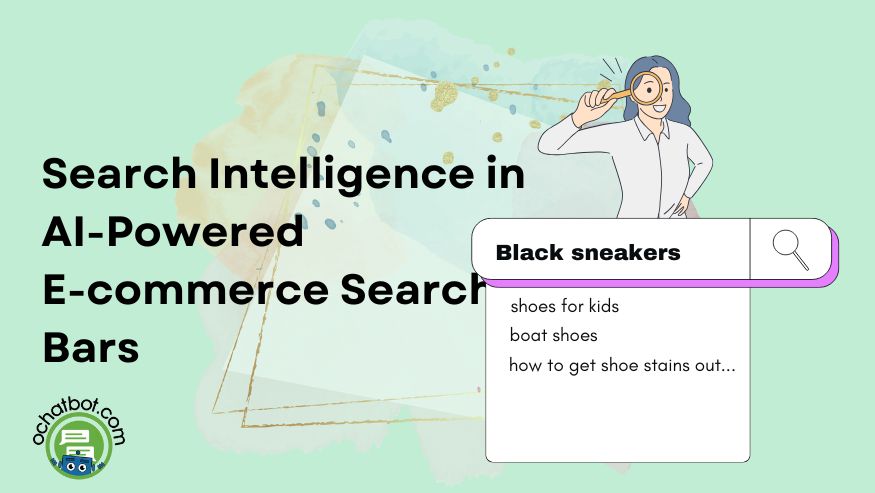
The e-commerce landscape is booming. With millions of products available online, the ease and ability for customers to quickly find what they’re looking for is the difference between making it to checkout and closing the tab. However, most e-commerce stores rely on the default search that comes with their platform. These traditional search bars often fall short of their one task: searching. Think of it this way–how often have you typed something in the search bar, perfectly spelled, and the thing you’re searching for still doesn’t come up? Even more common, how many times have you had the product on the tip of your tongue so you try to type in a description like, “black sneakers with neon laces,” and get zero results? These search bars rely on simple keyword matching, so they’re not meant to understand human language.
Now that we’re almost drowning in AI solutions, there are better options. Many sites employ AI chatbots with product search and conversational abilities to lead their customers down the sales funnel. But while AI chatbots are fantastic, not all are made with the same quality, leading to a frustrating experience. There is also a large segment of the population still apprehensive about using a chatbot. These people are still a powerful buying segment, so, as a smart business owner, you need to meet them halfway. This is where search intelligence, powered by AI, comes in.
What is Search Intelligence?
It may look like a regular search bar, but it’s far from that. Search intelligence uses several AI concepts to enhance searchability, including Natural Language Processing (NLP), Machine Learning (ML), and Knowledge Graphs.
- Natural Language Processing (NLP): NLP enables search engines to understand the nuances of human language, going beyond simple keyword matching. It allows users to search using natural, conversational queries, interpreting synonyms, misspellings, and colloquialisms to accurately identify user intent.
- Machine Learning (ML): ML algorithms personalize search results based on individual user behavior, purchase history, and browsing patterns. This results in more relevant product recommendations, predictive search suggestions, and optimized product ranking.
- Knowledge Graphs: Knowledge graphs create a semantic network of interconnected data, linking products, attributes, and user needs. This enables the search engine to understand relationships between items, facilitating more complex and nuanced searches.
What are the Key Features and Functionalities?
- Visual Search: Visual search utilizes image recognition technology, allowing users to find products by uploading images or using their phone camera. This facilitates product discovery for shoppers who may not know the exact name or keywords for an item. One of the most well-known examples of this is Google’s Image Search.
- Voice Search: Voice search offers hands-free convenience, allowing users to speak their search queries. This enhances accessibility and caters to the growing popularity of voice-activated assistants.
- Faceted Search: Faceted search empowers users to refine their search results using filters like price, brand, color, and size, enabling them to narrow down options and find exactly what they need.
- Dynamic Filtering: Dynamic filtering adjusts filter options in real-time based on current inventory and trending products, ensuring that users only see relevant and available choices.
Why this Benefits E-commerce Businesses
When you look at the features, the benefits of search intelligence are a no-brainer for e-commerce. Improved search performance translates to increased conversion rates, improved customer experience, enhanced product discovery, and reduced bounce rates. Let’s break that down:
- Increased Conversion Rates: By providing more relevant search results and personalized recommendations, AI-powered search leads to higher conversion rates and increased sales.
- Improved Customer Experience: Customers are addicted to convenience. An easy-to-use, intuitive site keeps them coming back and fosters loyalty.
- Enhanced Product Discovery: Search intelligence helps customers discover relevant products they might not have found otherwise, leading to increased sales and engagement.
- Reduced Bounce Rates: Accurate and efficient search reduces frustration and decreases bounce rates, keeping users on the site longer.
- Valuable Data and Insights: AI-powered search provides valuable data on customer behavior and preferences, enabling data-driven decisions for product development and marketing strategies.
AI-powered search also provides valuable data and insights into customer behavior and preferences, enabling data-driven business decisions.
Why This Benefits the Shoppers
For shoppers, the advantages are equally compelling:
- Effortless Product Discovery: Search intelligence simplifies product discovery, making it easier for shoppers to find what they need quickly and efficiently.
- Personalized Shopping Journey: Personalized search results and recommendations cater to individual preferences, creating a more tailored and enjoyable shopping experience.
- Faster and More Efficient Search: AI-powered search reduces the time and effort required to find desired products, streamlining the shopping process.
- Increased Satisfaction and Loyalty: A positive search experience leads to increased customer satisfaction and fosters loyalty towards the e-commerce platform.
Implementation and Best Practices
As with any e-commerce tool, businesses need to do their research before jumping on a trend. Poorly implementing a new AI tool without doing your due diligence can lead to disastrous consequences.
So how can you know if AI-powered search intelligence is right for your business? If you’re currently struggling with:
- Low conversion rates
- A large number of SKUs
- Insufficient search
It’s time to consider search intelligence. Here are the steps you need to take:
- Choose the best solution based on your needs and budget.
- Ensure your data is optimized for easy data integration. Search intelligence thrives on accuracy and organization. If your site is a mess, you’re making the process harder.
- Conduct A/B tests once it’s live. You need to monitor this new tool, especially in the first few weeks, to ensure it’s working well.
- Try to seek feedback from your customers. Improving the customer experience is the ultimate goal here, so you’ll want to listen to what they have to say. Consider sending out surveys.
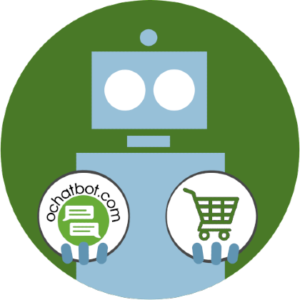
Generative and Scripted AI to engage shoppers in conversational eCommerce.
Create happy customers while growing your business!
-
1 out of 4 shoppers make a purchase on average*
-
5% to 35% Increase in AOV*
-
25% to 45% Reduction in Support Tickets
WE GUARANTEE RESULTS!
*When shoppers engage with Ochatbot®
Our Recommendations
Algolia

Source: Algolia
Algolia is a leading Search-as-a-Service provider that boasts powerful AI features. Their platform combines natural language processing with keyword matching to deliver fast and relevant search experiences across websites and mobile apps. They are known for their highly customizable solutions and developer-friendly tools.
Coveo
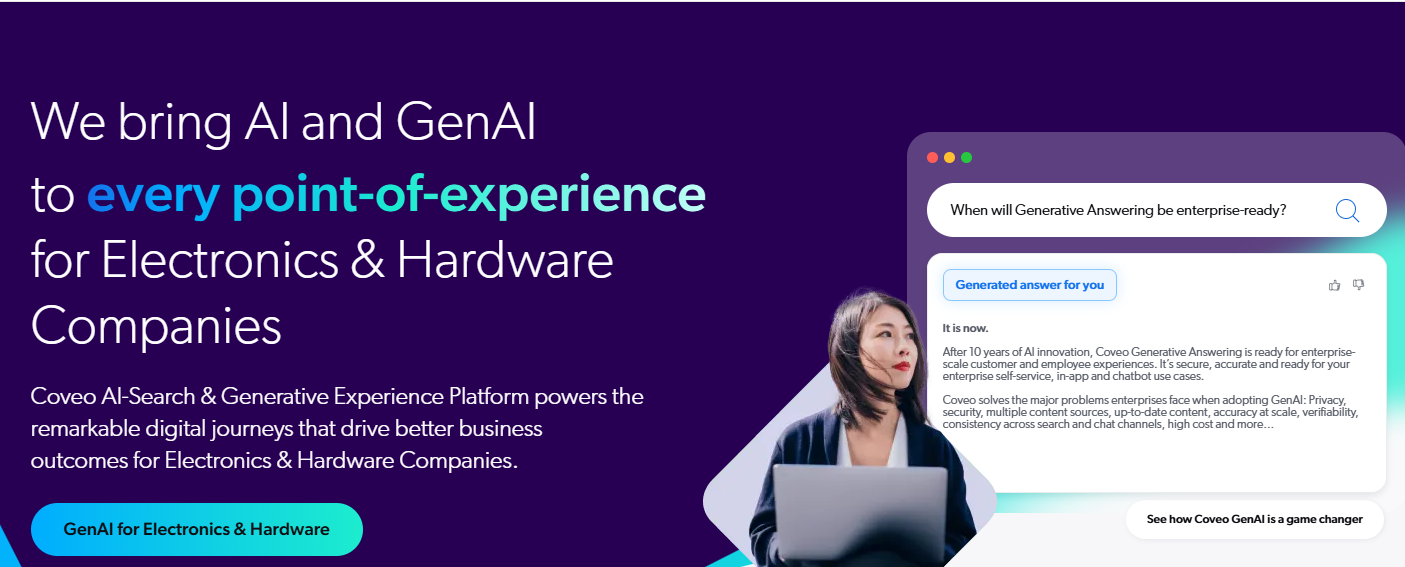
Source: Coveo
Coveo offers an AI-powered search and recommendation platform that understands shopper intent and delivers personalized results. Their platform integrates with various data sources to provide a unified search experience. Coveo is particularly strong in understanding complex customer journeys and offering relevant recommendations.
Elastic Enterprise Search
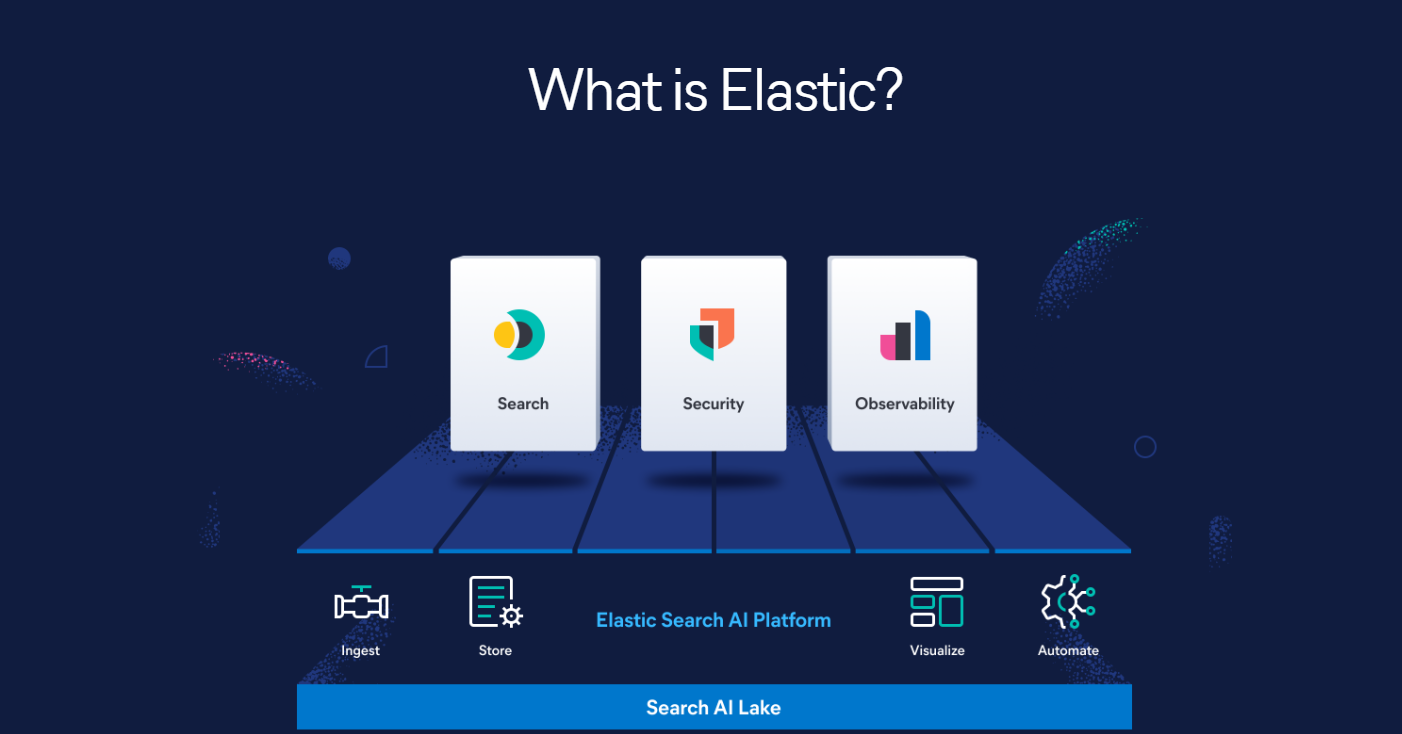
Source: Elastic Enterprise Search
Elastic is well-known for its open-source search engine, Elasticsearch. Their Enterprise Search solution adds advanced AI capabilities, including natural language processing and machine learning, to deliver relevant search results and personalized recommendations. They offer a robust and scalable solution for large e-commerce businesses.
Bloomreach
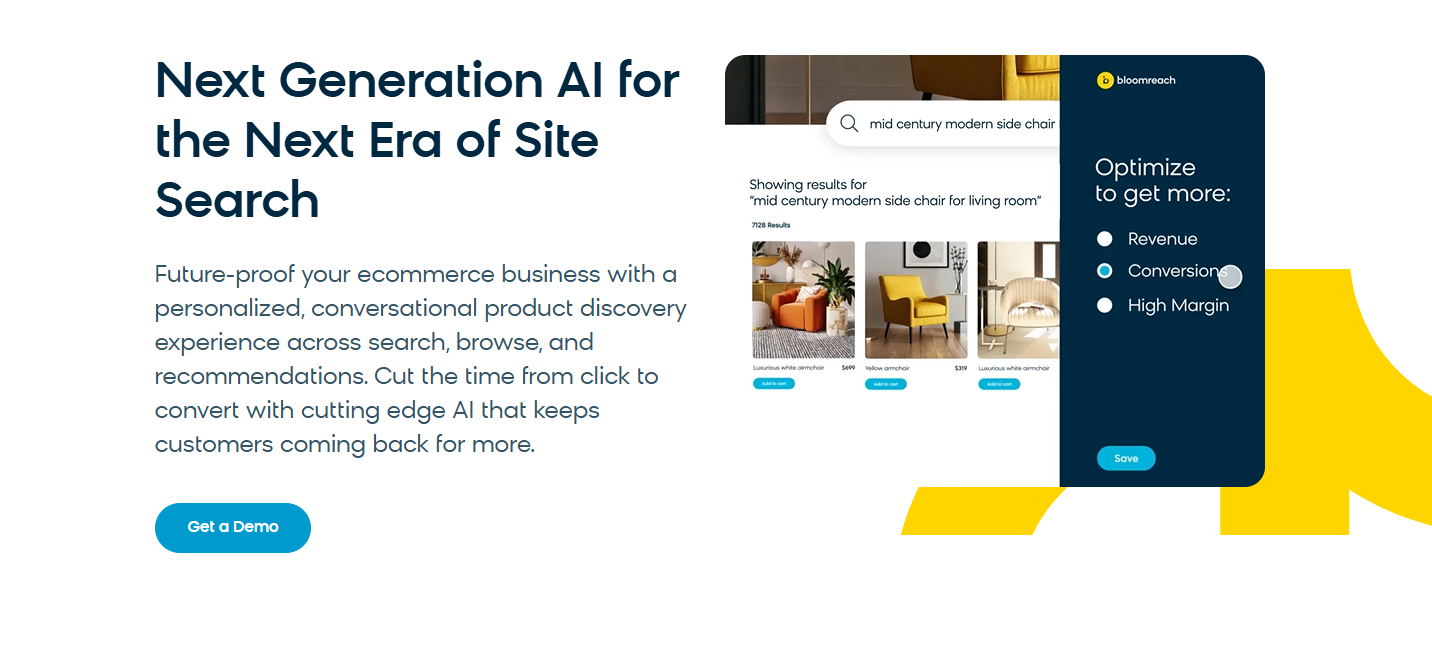
Source: Bloomreach
Bloomreach provides a comprehensive digital experience platform that includes AI-powered Search. Their search solution focuses on understanding customer intent and delivering personalized results across different channels. They are known for their strong focus on product discovery and merchandising.
Constructor
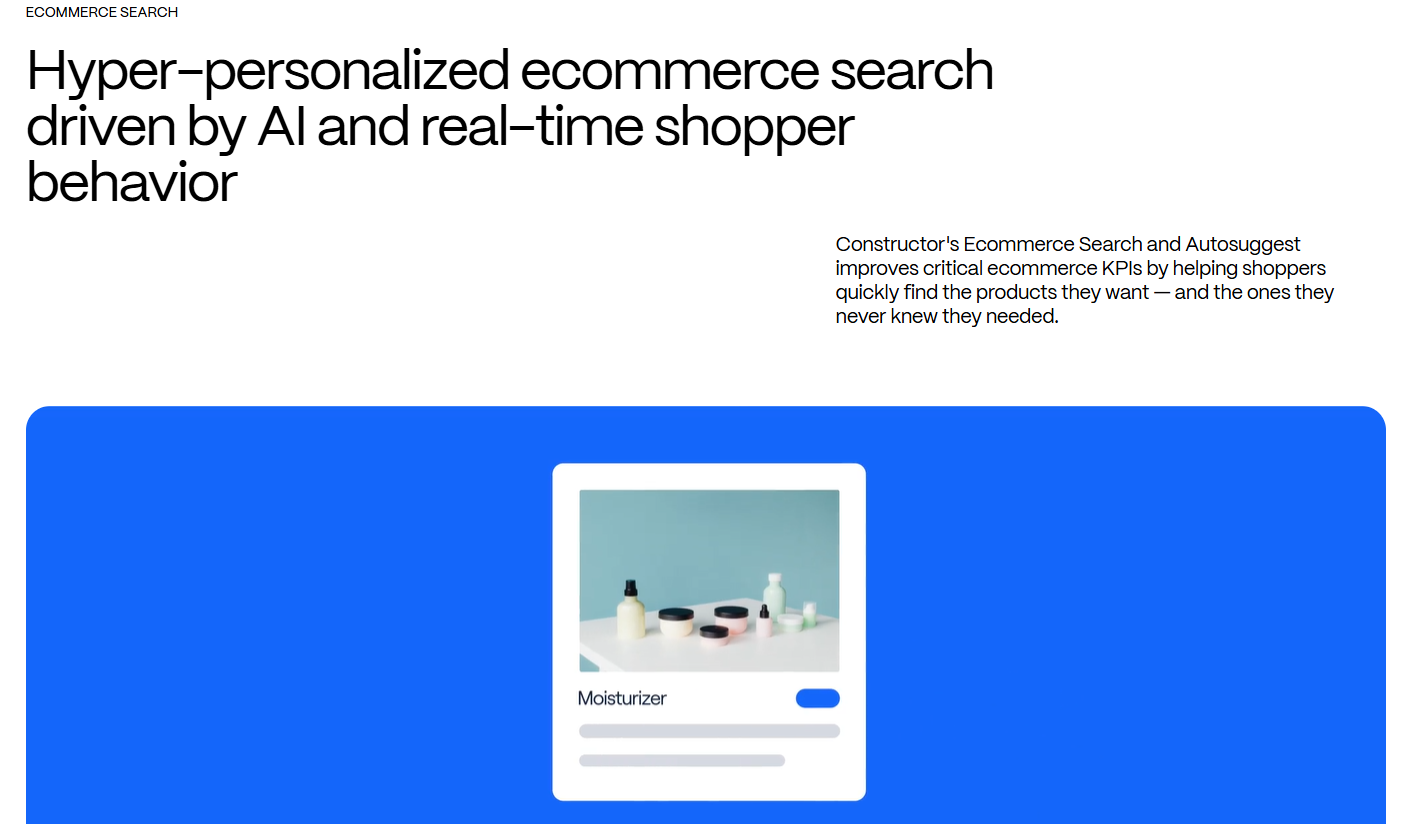
Source: Constructor
Constructor specializes in AI-powered search and product discovery. Their platform uses machine learning to optimize search results, predict user intent, and offer personalized recommendations. They are known for their focus on increasing conversion rates and revenue for e-commerce businesses.
Where is Search Intelligence Going? Future Trends
Technology never stops developing. You may just be hearing about search intelligence, but the industry is constantly shifting and trying to optimize the online shopping experience. Here are rumblings we’ve been hearing about in the AI space:
- Hyper-Personalization: Future search experiences will be hyper-personalized, tailoring results to an unprecedented level of individual preferences and needs.
- Augmented Reality (AR) and Virtual Reality (VR) Integration: AR and VR technologies will further enhance product visualization and create immersive shopping experiences.
- Emotional AI and Sentiment Analysis: Emotional AI will analyze user sentiment and emotions to better understand their needs and provide more personalized recommendations.
- The Rise of Conversational Commerce: Conversational commerce will enable natural language interactions with AI assistants, facilitating seamless and personalized shopping experiences.
The Takeaway
Optimize, optimize, optimize. That’s the name of the game in online shopping. Search intelligence promises optimization and more: personalization, understanding, and efficiency. By tapping into the power of AI, we’re not just making e-commerce more efficient – we’re making it more human. This means a future where finding the perfect product is effortless and enjoyable, leading to happier customers and thriving businesses alike. And this is just the beginning. As AI continues to evolve, the future of online shopping is limited only by our imagination.
Frequently Asked Questions
- What exactly is “search intelligence” and how does it differ from regular search?
Search intelligence goes beyond simple keyword matching. It uses AI to understand the meaning and intent behind your search, taking into account things like synonyms, misspellings, and even your personal preferences. This means you get more accurate and relevant results, faster.
- Is search intelligence only about text? Can it understand images or voice commands?
A: Not at all! Search intelligence can encompass various modalities, including visual and voice search. You can upload an image to find similar products or use voice commands for a
- What is a “search intelligence platform” and do I need to build one from scratch?
A search intelligence platform is a comprehensive solution that provides all the necessary tools and technologies for implementing AI-powered search. Fortunately, you don’t need to build one from scratch. Many providers offer ready-to-use platforms that can be integrated into your existing e-commerce infrastructure.
- How much does it cost to implement an AI-powered search solution?
The cost varies depending on the specific platform, features, and complexity of your needs. Some providers offer subscription-based models, while others may require custom development. It’s best to contact different vendors to get a personalized quote.
- Can search intelligence really understand what I mean, even if I don’t know the exact keywords?
- Yes, thanks to natural language processing (NLP) and machine learning (ML), search intelligence can decipher the meaning behind your query, even if you use colloquialisms, misspellings, or incomplete sentences.
- How does search intelligence handle user privacy?
Reputable search intelligence solutions prioritize user privacy. They use data anonymization and encryption techniques to protect sensitive information and comply with relevant data privacy regulations.
- What are some examples of companies successfully using search intelligence?
Many leading e-commerce companies are already leveraging search intelligence. Some examples include Amazon, eBay, and ASOS, which use AI-powered search to personalize recommendations, improve product discovery, and enhance the overall shopping experience.
- The Best Chatbots for Customer Service: Boost Support and Save Time - April 11, 2025
- Top 5 Must-have Shopify Review Apps - March 14, 2025
- Ochatbot Quick Tutorial #1: Help customers find products with Generative AI - December 12, 2024
